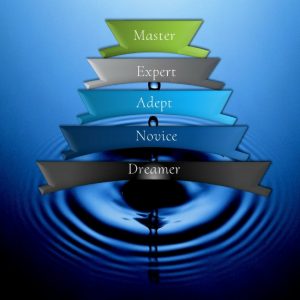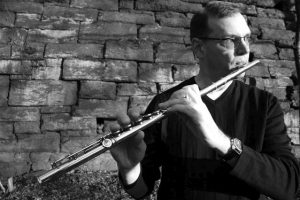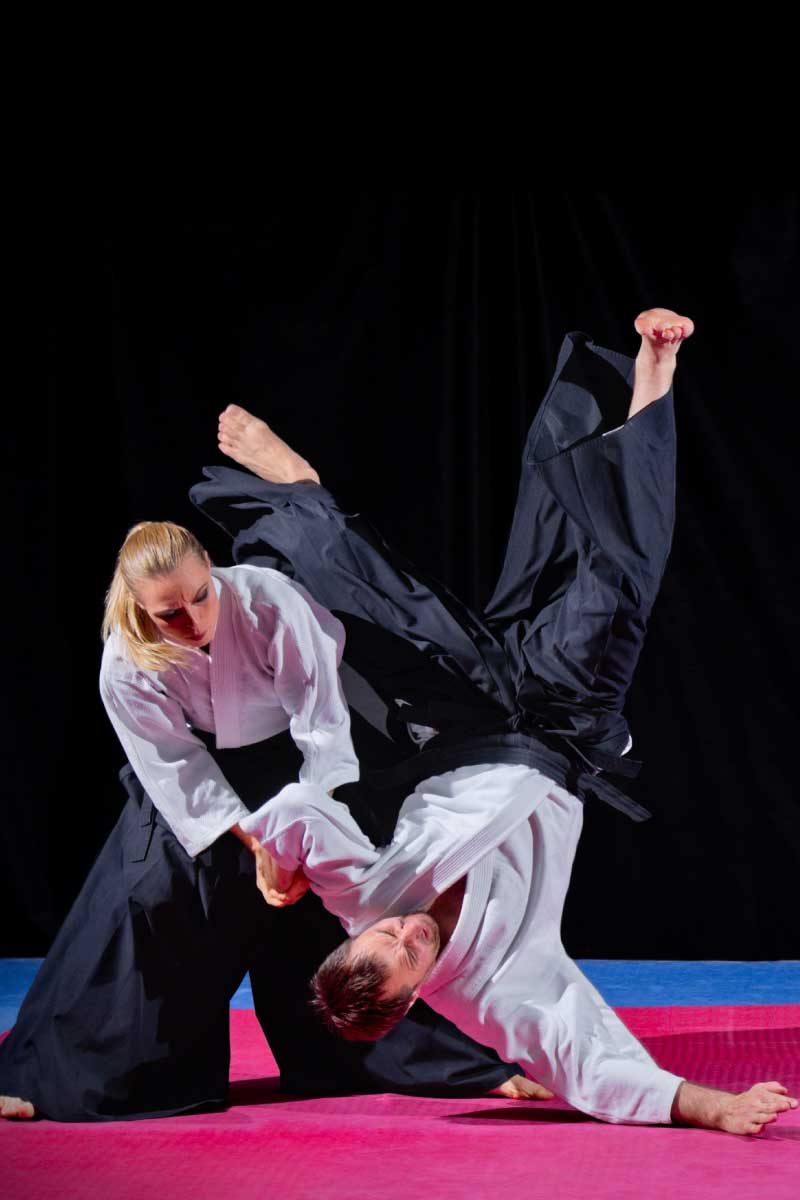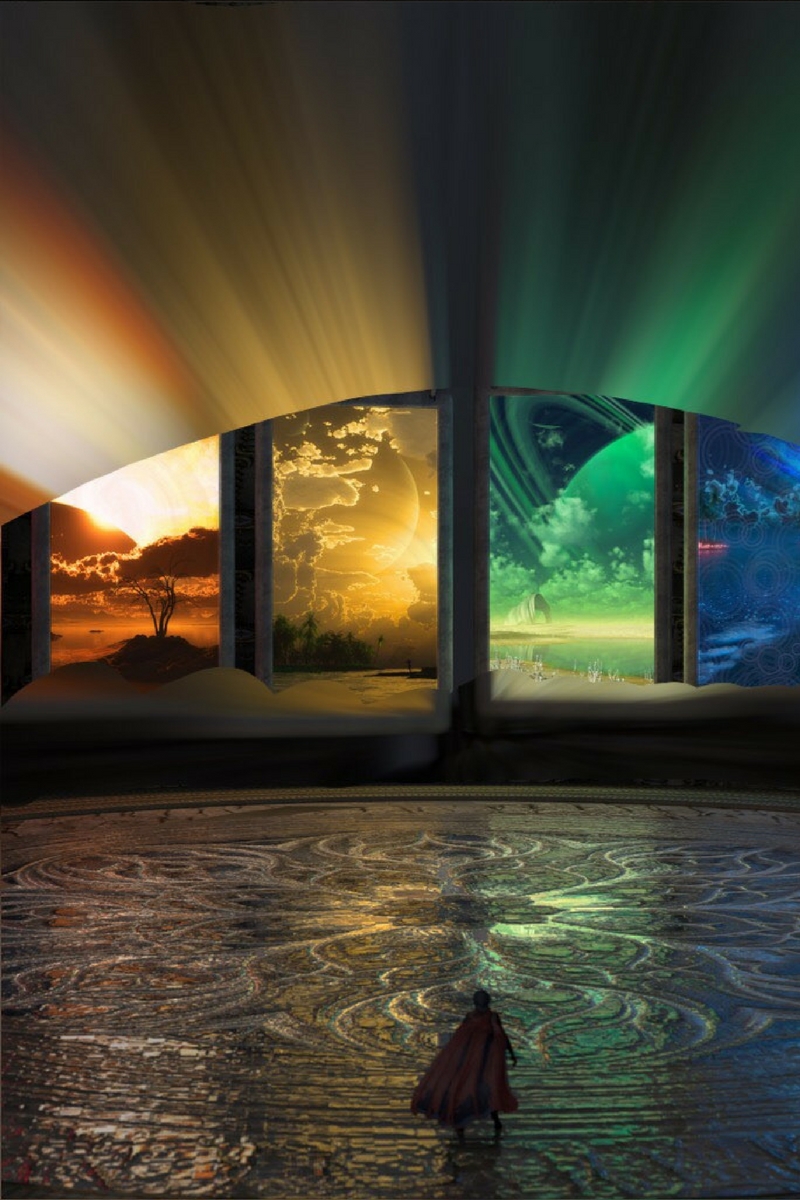“One can have no smaller or greater mastery than mastery of oneself.” ~ Leonardo da Vinci
In this article, we’re going to explore the five stages of mastery. Find your favorite chair, grab a cup of coffee, tea (or other favorite drink) and settle in – I hope you find value in it. I believe that there are five stages one must travel, the journey every one of us must take, to achieve mastery – in any area of life, big or small:

Stage I: “The Dreamer” (“I don’t know what I don’t know”)
This is a fun stage, no? At this stage (like with any new endeavor), you’re excited. You’re excited about the possibilities. And the greater the interest, the greater the pleasure and motivation. Everything is rainbows and butterflies. You’re unconsciously incompetent, meaning: “I don’t know what I don’t know…”. Your mood is high, enthusiasm higher still, and expectations are positive. Your dreams and imagination run wild, presenting a beautiful future with perfect outcomes. Life is good, and it feels good.
This stage is really you deciding to embark on a journey – you’re packing your bags and preparing for the trip, but you haven’t taken the first step. This may surprise you: a lot of people never take the first step – sometimes the dream provides so much pleasure and comfort that it’s enough just to live in the dream.
“Most novices picture themselves as masters – and are content with the picture. this is why there are so few masters.” ~ Jean Toomer
Stage II: “The Novice” (“I now know what I don’t know…”)
Ah, here we go now. “What was I thinking!” Reality starts to sink in, as you begin to see the “cost” of pursuing this thing (skill, ability, talent, whatever). Everything looks feels and is difficult (impossible at times even). You’re consciously incompetent, meaning “I now know what I don’t know.” Standing at the foot of the mountain, the task at hand looms large and daunting. The reality of where you’re starting out from slams home and you either set about to push through it from desire, determination and will power, or you’re guided through via a coach or mentor. Both ways are hard, and many, many people fall out and quit here. Even though you’re swimming in a sea of frustration, anxiety, and uncertainty, this stage is a temporary one – you can’t stay here. It feels like forever, but it’s not, and you will either progress through to the next level or the dream dies here at the plateau. You’ll have either victory, or a mere story to tell…
“Try, try, try, and keep on trying is the rule that must be followed to become an expert in anything.” ~ W. Clement Stone
Stage III: “The Adept” (“I know what I know and it’s starting to show…”)
Okay, now we’re getting somewhere. Woo hoo! You resisted quitting; you had just enough – will power, or the right coach, mentor, time, drive – something to motor through to the other side. You’re consciously competent, meaning “I now know what I know and it’s starting to show.” There are many reasons as to why you’ve made it, but for now, you don’t really care. Whatever the reason, you’ve gained real abilities, skills, and if we’re being honest – it’s a relief. Pride lives here – confidence and satisfaction too. Still, you’re a little uncomfortable because the gains you’ve made still feel a little fragile. New fears set in, and on some level, you’re asking: “What now?” “What if I can’t go any further than this?” “What will people think of me? What will I think of myself?” “What will it say about me if I don’t improve or grow from here?”
A dozen questions, a hundred, it doesn’t matter. Fear is fear, and it shows up here. Again, drive on, the feeling will fade, it will pass, but know this: you can plateau here and stay here. Many people who are competent, but average operate here, and for most, that’s fine (and sometimes, simply through the passage of time, one can advance and be considered an expert in something, albeit involuntarily). But for you and me, mastery isn’t something we want to leave to chance; we’re aiming for something greater for ourselves. “Average” is where the game is just getting started, just getting interesting, so let’s move on.
“The top experts in the world are ardent students. The day you stop learning, you’re definitely not an expert.” ~ Brendon Burchard
Stage IV: “The Expert” (“What I know is a part of me.”)
Ah, “what I now know is a part of me.” You’re unconsciously competent, and are both highly skilled and proficient, reaping the rewards for the hard journey. There are very few people at this level (many may claim it, but few genuinely possess it). The best of you, is skillful, confident, proud of your accomplishments, yet humble (and generous), knowing acquiring knowledge and skill is a never-ending journey. The worst: arrogant, selfish, condescending and surprisingly closed-minded to new discoveries, new observations. Like the stage before, one could spend a lifetime (and comfortably I might add) at this stage, reaching one’s full talents and abilities, but not beyond. This stage is a big deal since so few arrive here.
“The more aware of your intentions and your experiences you become, the more you will be able to connect the two, and the more you will be able to create the experiences of your life consciously. This is the development of mastery. it is the creation of authentic power.” ~Gary Zukav
Stage V: “The Master” (“I am what I know…”)
Old samurai and kung fu movies aside, achieving mastery – over anything – is kind of a big deal. People who’ve attained a level of mastery are a curious lot. Everything they do appears “effortless” to the casual observer; but beneath this, lies a lifetime of lived experiences, experimentation, and a thousand successes and failures big and small. Malcolm Gladwell, once famously wrote that mastery could take a person 10,000 hours to achieve – it’s a tidy number and beautiful thought, and I believe there’s more to it. I think there isn’t any way to really know the number – it depends on the person, their innate God-given abilities, their learning environment – just dozens of factors which bring a person steadily – or not – to a level of mastery.
The more important point is that at this level, you’ve essentially moved from learning, trying and doing to experiencing, observing and being. The entirety that is you embody this mastery. Your thoughts, beliefs, breath – your very being – is and represents this mastery.
People that achieve this level often talk about time slowing down, becoming still, being the thing they are doing. They talk a lot about being in a “flow state,” where most of whatever they’re doing happens far below their conscious self, leaving only an awareness just on the surface.
For the few individuals that have reached this level, mastery can be felt through the senses and touch one’s, heart. Perfection aligned with the human being is rare to witness and when in the presence of mastery, always leaves an impact…
My personal journey towards mastery
As I’ve mentioned in other articles here in the community, I find myself obsessed with the idea of mastery…
One of my favorite pastimes these days is playing the flute. I’ve been playing the flute since I was 9 years old (quite a few years ago, I know,) and playing as an adult has been like entering a new world. As a child, I played simply for fun, and as time progressed, I became more serious about it, performing in school bands, competing and taking private lessons.
I played all through junior and high school, and when I graduated, I ended up going to Berklee College of Music in Boston. There, I studied for my bachelor’s in music performance. And towards the end of my sophomore year, Berklee’s teachers went on strike and my whole world changed. In the middle of all of this drama, I realized I didn’t want to make music my profession, so at the end of the year I left Berklee – and most things involving music – behind and instead, went to live in “the real world.”
Before leaving Berklee, I had reached the level of serious amateur (“Adept”) but fell well short of becoming an expert musician. So, I go into the real world: working a 9 to 5 government job, then after a layoff moving into technology consulting, and the flute – and joy of playing music – became a distant memory and then, forgotten.
It would be seven years before I found my way back to music and the flute. Now an adult, I discovered a renewed excitement and passion for it. Free from the burden and stress of having to figure out how to make a living as a musician, I found new joy in playing. And armed with the financial means from my professional “day job,” I was able to acquire a rare flute made in 1875, Paris, from the Stradivarius of flute makers: Louis Lot.
Louis Lot made flutes for the virtuoso (“master”) flute players at the time, and in the hands of an amateur (me), the flute was very difficult, punishing and unforgiving. It was like trying to drive a Ferrari on a race track with only the experience of riding a bicycle. Everything was hard, nothing easy, and no amount of willpower seemed to make a difference.
And over the course of two years, something happened: the flute became easier to play. I started to sound better on it; my technique improved. Things that were impossible a year before I could now do with ease. I suddenly realized that, through a series of small changes over time (changes so small, that I didn’t even notice), I had become a better player…

Fast forward, it’s now 2015, and I’ve been playing – and progressing – steadily for four years and I hit the wall. I plateaued. Having gone as far as I can on my own, I seek out a teacher. Not just any teacher, I seek out one of the World’s best: Keith Underwood. Prior to contacting Keith, I purchased access to several masterclasses he had recorded over the years and spent the next six months and about 100 hours reviewing them and applying what I learned. Keith is among a rare breed of teachers in that he’s a life-long student himself, having studying flute methods dating back to the early 19th century, performs on late 18th century and early 19th century instruments, and owns and plays on a Louis Lot flute himself. But the kicker for me was that we both are admirers of the late Jean-Pierre Rampal (it was hearing him play that inspired me take up the flute in the first place). Once I felt I had a good understanding of his teaching style and approach, I wrote to him, requesting to be his student, and he agreed to take me on.
Have you ever seen a building being demolished by a bowling ball, or leveled to the ground from explosives? This was how my first few lessons with Keith felt like – and it’s what I expected. The next six months were spent unlearning, undoing decades of bad technique, bad habits – just plain bad things – tearing down the big and little things I was doing that were preventing me from ever improving or gaining new ground. Every lesson felt like my brain was being scrambled; my conscious mind and instinct, patterns and routines overloaded, bypassed or overwritten. For sixty to ninety minutes, my brain’s judging mind and critic were stymied, bamboozled, bombarded and hijacked with so much new material, insights, discoveries, and input. I didn’t have time to get in the way of things, leaving me to feel as though I was drinking from a fire hydrant. Utter chaos elegantly delivered one session at a time. Observation without judgment, awareness without fatality; challenge, criticism, creative destruction and then rebirth – all with growth and learning in mind. The perfect storm…
Listening back to the lesson recordings, I couldn’t even recognize myself, it was that bad. Raw and unfiltered, lessons were hard, frustrating, maddening – and exciting all at the same time. These lessons weren’t about getting a pat on the back or doing what I already know. No, these lessons were about exploring the road untraveled, ignoring discomfort and going beyond what was never imagined.
This was going beyond being an amateur, arriving at the space in-between amateur and expert. In the hands of a master teacher like Keith, I caught up then leaped ahead, gaining what felt like a decade of advancement within a year’s time. Nothing wasted; no travelling down the wrong roads – or the right roads with the wrong technique. Tremendous time savings, advancement and growth, compressed in hyper-time.
Today, I remain in this middle space; expert in some things, some aspect of flute playing, a novice still in other aspects. And since my only goal is to simply become the best flute player I can possibly become for the rest of my life, I don’t have mastery as a destination, but with enough time, I may arrive at the end of my life as one. For now, I’m grateful and content being on the journey…










